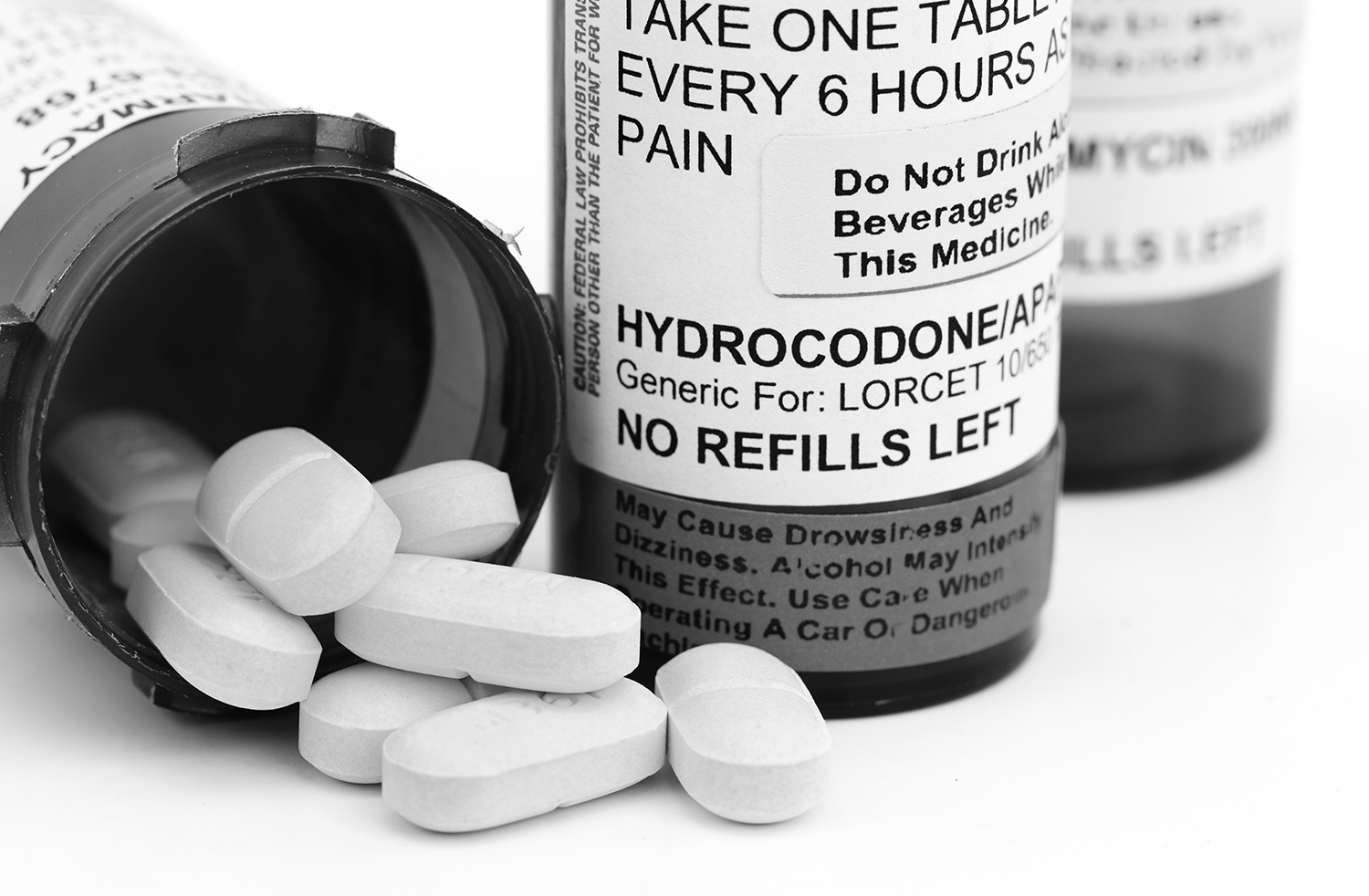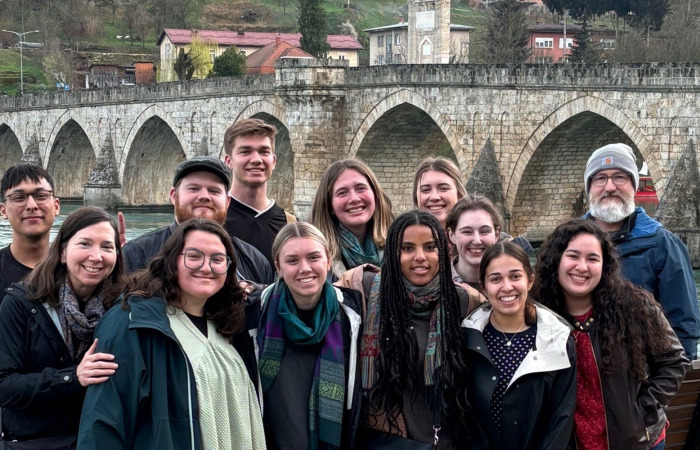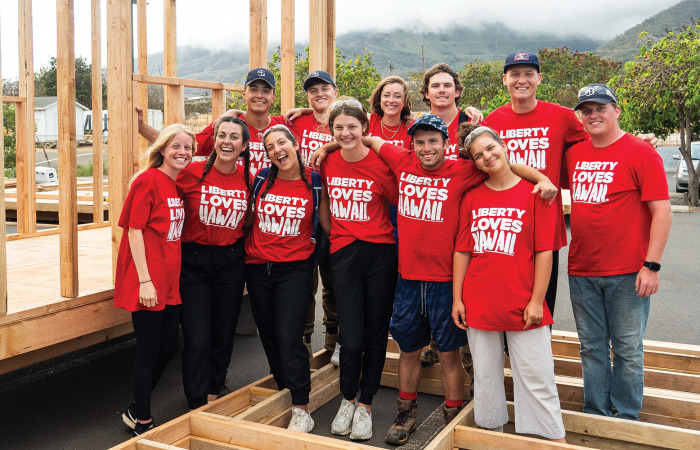Each story in this special feature section demonstrates a tenet of the “We The Champions” Declaration, part of a university-wide project that aims to tell the world how Liberty is fulfilling its mission of Training Champions for Christ.
We The Champions: Bring Healing to the Hurting
Marlon BaCote was high on crack and heroin, dragging himself through the shadowy projects one night somewhere in Texas when he heard voices hissing at him. “Where’s your Jesus now?”
BaCote was alone, already shaking head to toe, sweat dripping down his face and arms. The ache deep in his bones was a hundred times worse than any flu, every cell in his body desperate for another fix.
But with the voices taunting him, he knew there was only one thing to do.
He dropped to his knees and began shouting out the words of Psalm 91. Words his mother had taught him when he was a child. BaCote had never needed those words the way he did in that moment.
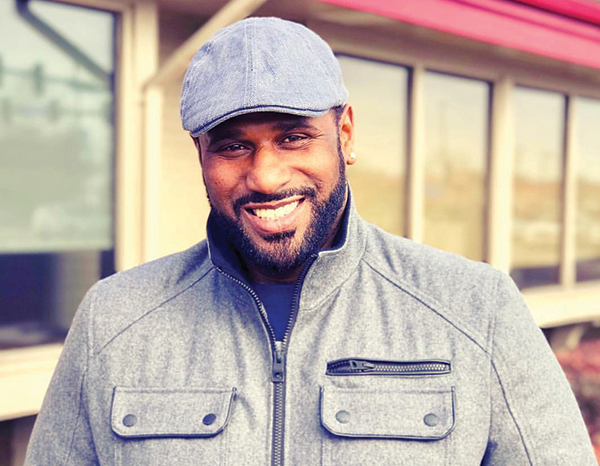
Marlon BaCote
Even now he can hear himself screaming into the midnight air. “He who dwells in the shelter of the Most High will rest in the shadow of the Almighty!” BaCote’s conviction still rings in every word as he recalls that moment. “I will say of the Lord, He is my refuge and my fortress, my God in whom I trust!”
Wielding Scripture like a weapon, BaCote remembers watching the impossible happen, right before his eyes.
“The demons turned away,” BaCote says. He still shudders at the glimpse of hell he saw that night. “Then and there I surrendered my life to Jesus.”
Drug addiction held BaCote captive for 25 years. Seventeen of those he spent in and out of jail and prison. He was homeless, sleeping under bridges, shot at, and stabbed. He was kidnapped and taken to be killed by gang members. He overdosed too many times to count.
But after that night in the projects, things changed.
Today BaCote is a student in Liberty University’s online M.A. program, studying addiction counseling and professional counseling. He has a wife and children who love him.
He has been clean for the past four years.
“I chase after God and helping people the way I once chased after drugs,” BaCote says. “God empowered me to stay clean and free of those evil spirits. Drugs are the devil in a pill.”
BaCote spends his days offering peer counseling to addicts on the streets in Virginia’s Tidewater region, doing his part in the war against the current opioid addiction crisis. He doesn’t carry needles and drugs on him these days. He carries Narcan — the antidote for heroin. Recently, he was driving to help an addict when he happened upon a drug overdose victim. BaCote quickly administered Narcan and saved the man’s life.
When he isn’t helping addicts find their way to rehab, BaCote is learning. Liberty University is one of his favorite places in all the world. “God led me here, no question,” BaCote says. Each semester he comes to the residential campus in Lynchburg for intensive sessions in his coursework. “I call it a God place. Liberty. The campus. The students being trained to follow Jesus. It’s incredible. I mean, we pray and worship before class. Man, there’s nothing like it.”
But BaCote feels his purpose most when he’s on the streets, helping addicts who are exactly like he was for more than half his life. He is available 24 hours a day through his counseling practice, MB Health and Wellness.
“I’ll come to you because I know what it’s like to want to get clean and need that help,” BaCote says. “It happens at nighttime in the darkness where those spirits are alive and well. You got addicts walking down the street, money gone, can’t go home. They’ve stolen and lied and they’re locked out of their houses.”
BaCote says there is no typical user, especially when it comes to opioids. He remembers life before drugs. Growing up the youngest of three brothers, BaCote’s whole life was about football. He and his family lived in a beautiful suburban neighborhood and both his parents worked in education.
“We had a wonderful upbringing, a wonderful family,” BaCote says.
BaCote’s parents were married nearly 50 years when his father passed away in 2010.
After high school, BaCote went to Northeastern University on a football scholarship. At that point he had never tried a drug, never drank. He says football was his drug, and he didn’t want anything to ruin that.
But when he came home the summer after his freshman year, his middle brother took him to a party. “An hour later he came up to me and said, ‘Try this!’” BaCote remembers. “I didn’t know what it was, but I took it. Worst decision of my life.”
The drug was crack cocaine, and BaCote spent the rest of the summer and all his money trying to find his next fix. He barely made it through the fall semester of his sophomore year before dropping out. A month later, he was arrested for his first drug charge. After that, BaCote was no longer a football player.
He was a drug addict.
He believes his experience of both the suburban life and the street life makes him particularly equipped for counseling addicts.
“They pray, and God sends them to me,” he said, smiling big when he says the next part: “God has called me to be that person. I’ll come to you. I’ll pick you up. Wherever you are, I’ll come find you and get you help.”
BaCote explains that the window of hope for a desperate drug addict is brief. “If a user can’t reach someone, if he thinks no one really cares, then he’ll be off on another binge,” BaCote says. “Sometimes that window is only a few minutes long. Especially with these opioid addicts.”
Opioids: Worst Drug Crisis in American History
In March, President Donald Trump signed an executive order to establish the Commission on Combating Drug Addiction and the Opioid Crisis. On Aug. 10, he announced his intentions to declare a national emergency in the war against opioid addiction. The numbers are staggering and getting worse. Deputy Attorney General Rod J. Rosenstein announced that opioid overdose is now the leading cause of death for people under age 50.
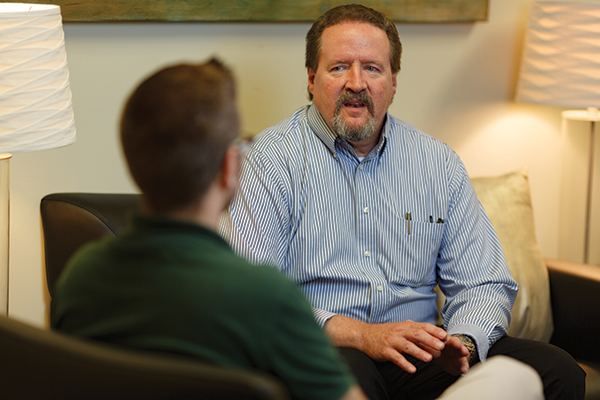
Dr. David Jenkins is the director of the Master of Arts in Addiction Counseling program, which launched two years ago through Liberty’s online program. The program provides the training needed for certification and/or licensure as a substance abuse or addiction counselor. Liberty also offers an online Master of Arts in Human Services Counseling, with a specialization in addictions and recovery, as well as two Bachelor of Science in Psychology degree programs with specializations in substance abuse counseling (offered residentially) and addictions and recovery (offered online).
This is one of the reasons why Liberty University started an online M.A. program in addiction counseling two years ago. Dr. David Jenkins heads the program and knows just how desperate the situation has become. He says the overprescribing of opioids contributed to the crisis and, although much work is being done within the health care industry to tighten up the standards on how painkillers are prescribed, the treatment and recovery side remains an important part of combating the epidemic. And faith communities, he says, are playing a key role. He says Liberty President Jerry Falwell takes seriously the university’s mission statement.
“For President Falwell, Training Champions for Christ is not simply a motto,” Dr. Jenkins says. “It’s a rallying cry!”
Nursing Alumna Starts Program for Addicted Moms and Babies
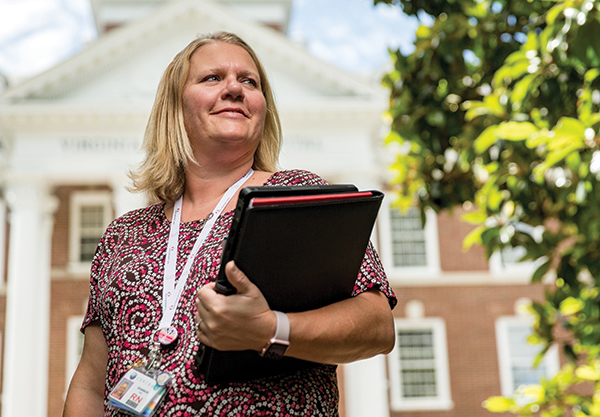
Shannon Miles
Liberty University nursing alumna Shannon Miles (’13) understands that rallying cry.
Miles works with expectant mothers at Virginia Baptist Hospital in Lynchburg. She helps them set appointments and acts as a resource while they journey through their pregnancies.
But in the past year, Miles began to see an alarming trend.
More and more pregnant mothers reported that they were addicted to opioids. To Miles, this brought the opioid epidemic up close and personal. Like all medical professionals, she knew that when a mother is addicted to opioids, her baby is affected, too.
An infant born to such a mother will need immediate IV medication to stave off intense pain during detoxification.
Three weeks of intensive care at the hospital is the norm for these babies, and often by then the state is involved. Typically, the mother goes back to the drugs and the streets, and the baby is placed in foster care.
“A tiny infant receiving IV meth because of his mother’s heroin addiction is about the saddest thing you’ll ever see,” says one local foster mother who has taken in these babies.
Nurse Shannon Miles wanted to see that terrible trend change.
She met with her hospital supervisors, and together they created two community coalitions to fight the spread of opioid addiction in Virginia. That meeting led additionally to the creation of a residential recovery program for pregnant and postpartum women near downtown Lynchburg.
The house opened in January and is the first of its kind in Virginia.
In May, Miles was honored as Nurse of the Year for her efforts. “It’s hard to imagine that I only graduated a few years ago. It means a lot,” Miles says. “All I want to do is help other people.”
Her efforts aren’t just bringing praise from her peers, they are also making a tremendous difference. The residential home Miles started is currently full with four mothers and their babies. Miles says that at Liberty she not only learned the skills she needed for nursing, but she also was encouraged daily to make an impact on the world for Jesus Christ.
Now, she is doing just that.
“I knew that I wanted to work with mothers and babies. That’s where my passion is, and Liberty ignited that passion to fight for those who need a voice,” Miles says. “In Liberty’s nursing department, we always say we are to be the hands and feet of Jesus, and that’s what this is.”
Indeed.
Miles has seen more than 20 local pregnant and postpartum women enroll in the medical assistance program she started. The program helps addicted mothers recover in a safe, nurturing environment. They also receive counseling. Mothers can stay at the residence for up to a year after giving birth.
The greatest reward, according to Miles, is seeing the mothers and babies thrive, when otherwise they would be separated, with the mothers out on the street and most likely back to their addiction.
Liberty’s Jenkins believes students like Miles are the perfect example of why LU’s new degree program is so critically important.
“The spiritual battle associated with addiction is intense,” Jenkins says. “True victory is only possible through the resurrection power of Jesus Christ, resident in and through us by the Holy Spirit because of the love of the Father.”
Marlon BaCote: The Battle Rages On
Marlon BaCote can’t talk much longer. He’s off to help another addict on the streets. One more person who just made the worst decision ever. The decision to get high on opioids.
BaCote says that with heroin, one or two times is all it takes. “After that, you’re vomiting, bones aching. You need that heroin just to feel normal.”
Liberty University has helped BaCote hone his deep desire to help people. He says counseling addicts is his purpose in life now. “God is there for me any time, day or night.” BaCote’s voice is rich with conviction. “It’s because of His love and mercy without limit that I’m here.”
Now BaCote wants to be there any time, day or night, for other addicts caught up in the opioid crisis. “I don’t put myself in a box when it comes to helping people, because God never put Himself in a box when it came to me.”
8 Things to Know about the Opioid Epidemic
1. Opioids include the illegal drug heroin, synthetic opioids such as fentanyl, and prescription pain relievers, such as oxycodone and hydrocodone. These drugs are chemically related in that they interact with opioid receptors on nerve cells in the body and brain. – National Institute on Drug Abuse (NIDA)
2. In 2015, more than 33,000 Americans died as a result of overdosing on opioids, including prescription painkillers, heroin, and illicitly manufactured fentanyl, a powerful synthetic opioid. (NIDA)
3. More than 90 Americans lose their lives every day after overdosing on opioids. (NIDA)
4. As many as one in four people prescribed an opioid long term for non-cancer pain in primary care settings struggles with addiction. – Centers for Disease Control and Prevention (CDC)
5. Approximately three out of four new heroin users report abusing prescription opioids prior to using heroin. – CDC
6. Every day, over 1,000 people are treated in emergency departments for misusing prescription opioids. – CDC
7. A drug called Naloxone provides an antidote to heroin during an overdose. This reversal drug — also called Narcan — is being used by first responders to save the lives of people who have overdosed.
8. President Donald Trump issued an executive order in March to establish the Commission on Combating Drug Addiction and the Opioid Crisis. On Aug. 10, he announced intentions to declare the opioid crisis a national emergency.
Help for Opioid Addicts
If you or someone you love has an opioid addiction, call one of these numbers. Each of them has counselors on duty, 24/7:
• Addiction to Sobriety – (877) 513-9585
• Narcotics Anonymous – (800) 974-0062
• American Addiction Centers – (877) 783-3097
• The Christian Treatment Center – (844) 329-6895
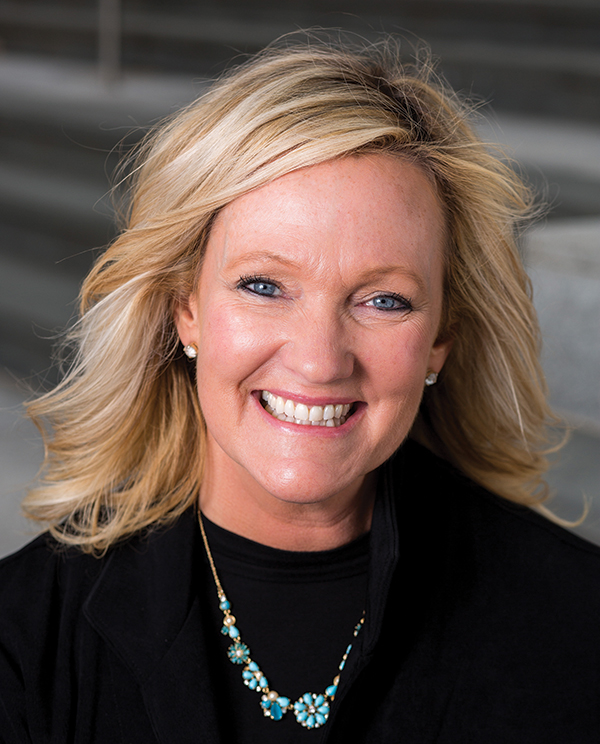 Karen Kingsbury is a #1 New York Times best-selling novelist, with more than 25 million copies of her award-winning books in print. Several of her novels are under development as major TV and motion picture films. She is also a much sought-after public speaker, appearing at major events including Liberty University’s Convocation, TED Talks, and other nationwide forums.
Karen Kingsbury is a #1 New York Times best-selling novelist, with more than 25 million copies of her award-winning books in print. Several of her novels are under development as major TV and motion picture films. She is also a much sought-after public speaker, appearing at major events including Liberty University’s Convocation, TED Talks, and other nationwide forums.
Karen is also an adjunct professor at Liberty, which recently bestowed on her an honorary doctorate. When on campus, she teaches master writing, research, marketing, and film classes. She also teaches several online courses and helped to establish the Karen Kingsbury Center for Creative Writing at Liberty.
She lives in Tennessee with her husband, Don, and their family.
Saving Lives
One important figure who is making major strides in combating the opioid epidemic is David Siegel, president and CEO of Westgate Resorts. He started Victoria’s Voice, a foundation that is working to create solutions to the epidemic by actively raising awareness about substance abuse and providing support to youth and families in overcoming experimentation and addiction. Siegel spoke at a Liberty Convocation in September 2015, just a few months after losing his 18-year-old daughter, Victoria, to an opioid overdose. He invited Liberty students to join him in Washington, D.C., the following weekend for a rally “to lift the veil off this horrible epidemic.” Since then, Siegel has been saving many lives by advocating for change across the country at the national, state, and local levels. He has met with the U.S. Surgeon General, the chief of the Drug Enforcement Administration, and dozens of federal and state legislators. He has also addressed school groups and has listened to recovering addicts at treatment centers. Liberty continues to support the Siegel family and the work of Victoria’s Voice. Visit victoriasiegelfoundation.org for the latest news on the opioid epidemic, resources for individuals and families struggling with drug addiction, and ways to become involved with the foundation as an advocate.
To be involved in the “We The Champions” project and read more inspiring stories from the Liberty community, visit Liberty.edu/Champions and follow #WeTheChampions on social media.
